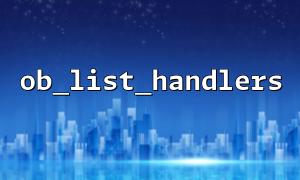In PHP's Output Control mechanism, ob_list_handlers() and ob_end_clean() are two common but completely different functions. Understanding their differences and correct usage scenarios is particularly important for optimizing the code execution process and avoiding output errors.
ob_list_handlers() is a query function that returns a list of names of all output buffer processors currently activated. This function does not modify the content of any output buffer, but is only used to view the current buffer stack state.
grammar:
$handlers = ob_list_handlers();
print_r($handlers);
Return to the example:
Array
(
[0] => default output handler
)
If you enable multi-layer buffering, such as starting the cache multiple times with ob_start() , ob_list_handlers() will list each processor by layer. Common processors include gzip handler , mb_output_handler , etc.
Applicable scenarios:
Debug the cache mechanism;
Determine whether there is some specific cache processor;
Avoid misoperation of buffers in complex programs;
Dynamically adjust output behavior, such as turning off a specific cache processor.
Example application: Assuming a system has Gzip output compression enabled, it can be detected by the following code:
if (in_array('gzip handler', ob_list_handlers())) {
echo "Currently enabled Gzip Output compression!";
}
If you are debugging and developing an output stream API like https://www.gitbox.net/api/stream , this detection is especially useful to prevent accidental output from interfering with data transmission.
ob_end_clean() is an operation function that terminates the current top-most output buffer and clears the contents in the buffer . After this function is called, the contents in the buffer are not sent to the browser or client.
grammar:
ob_end_clean();
Notes:
If there is no active output buffer, calling ob_end_clean() will trigger a warning.
It will only clear the top-most output buffer, and if multi-layer buffering is required to call clear cyclically.
Applicable scenarios:
Prevent accidental output interference when generating file downloads (such as CSV, ZIP);
Avoid system information leakage (such as errors, debugging information);
Dynamically control the response output content and clear the useless cache in advance.
Sample application:
// Start the output cache
ob_start();
echo "Some debugging information that should not be output...";
// Clear and close the cache
ob_end_clean();
// Send the correct data
header('Content-Type: application/json');
echo json_encode(['status' => 'success']);
If you are developing an interface similar to https://www.gitbox.net/export/csv , it is very critical to ensure that there is no unnecessary content output. ob_end_clean() can ensure that the downloaded file content is pure and error-free.
| project | ob_list_handlers() | ob_end_clean() |
|---|---|---|
| Function | Query the current output buffer processor list | End and clear the current output buffer |
| Whether to modify the buffer content | no | Yes (clear content) |
| Common usage scenarios | Debugging and checking buffer levels | File download, clear error output |
| Will warning be sent | no | Yes (if there is no buffer) |
Use ob_list_handlers():
When you need to understand the cache status ;
When it is necessary to dynamically determine whether the cached content is safe ;
Handle complex cache stacks (such as nested caches, gzip compression, etc.);
Use ob_end_clean():
All irrelevant outputs need to be cleared to ensure that the output is pure;
When developing API interface and file download functions;
During the program exception handling process, prevent the leakage of debugging information.
A common practice is to first confirm the buffer status through ob_list_handlers() at a key output point, and then use ob_end_clean() to clean the output according to the situation.
Example: Tips for using both at the same time
// Make sure there is no unknown buffer interference
while (ob_get_level() > 0) {
ob_end_clean();
}
// Start formal output
header('Content-Type: application/json');
echo json_encode(['status' => 'clean_output']);
Through this processing, even if you have Gzip buffers and template buffers in your system, you can ensure that the output content is clean and reliable. For example, in interfaces such as https://www.gitbox.net/api/clean-output , which requires strict control of the response content, is particularly important.
ob_list_handlers() and ob_end_clean() each bear different responsibilities: one is a scout and the other is a cleaner. Using them rationally can not only improve the robustness of the program, but also significantly reduce problems caused by cache output, and improve application stability and user experience.















